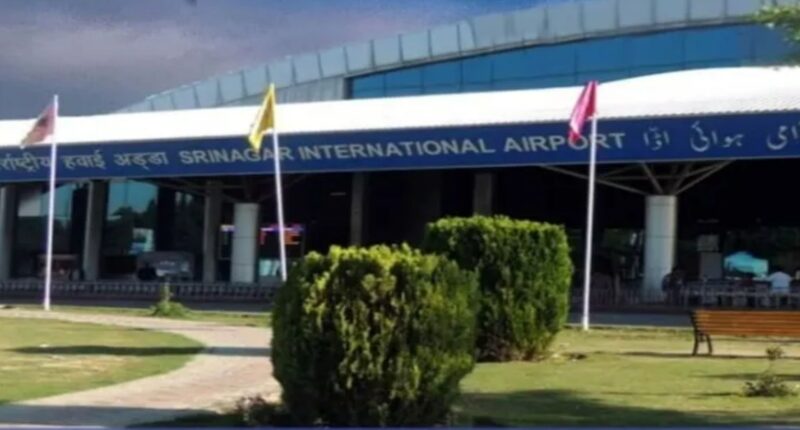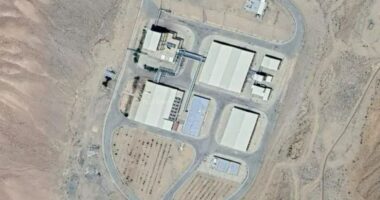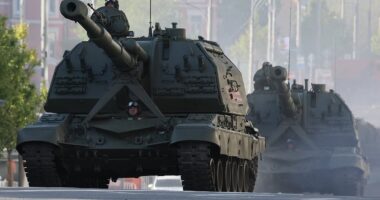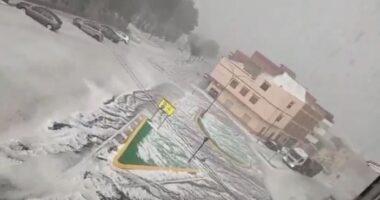AT least 10 explosions have been heard near Srinagar International Airport in India-controlled Kashmir, according to Indian officials.
The blasts come just hours after blackouts were issued and sirens were heard in the entire region amid reports of drone attacks in Jammu and Kashmir.


Indian defence sources said a new wave of drone attacks targeted Indian Kashmir for a second straight evening Friday, including the city of Jammu.
According to an Indian military official, drones have been spotted in Jammu, Samba in Indian-administered Kashmir, and in Pathankot in the neighboring state of Punjab.
“They are being engaged”.
Chief Minister Omar Abdullah of Indian-run Kashmir reported on X that intermittent sounds of blasts, likely heavy artillery, could be heard from his location in Jammu, noting that there was a citywide blackout.
There was no immediate comment from Pakistan, which dismissed Indian accusations that it had launched attacks on the same area on Thursday night.
Currently, heavy shelling and artillery fire are ongoing along the Line of Control (LOC) and the international border separating India and Pakistan.
Both sides have reported casualties amid the heavy exchange of fire.
Last night, India claimed some 300-400 drones were launched by Pakistan targeting several military installations across the region.
The attack was intended to check air defence systems and their response, according to intelligence officials.
In its latest press briefing, the Indian foreign ministry and military forces said that the drones were of Turkish origin, according to preliminary reports.
Pakistan has denied launching such attacks on Indian military installations.
In response to the drone attack, India launched a barrage of drone strikes targeting Pakistani military installations.
The retaliatory attack destroyed one air defence system, Indian Air Force officer Vyomika Singh told a media briefing.
Pakistan Information Minister Attaullah Tarar had dismissed earlier Indian accusations of Pakistani attacks as “baseless and misleading” and said Pakistan had not carried out any “offensive actions”.
Meanwhile, India accused Pakistan of using civilian planes as “shields” during its air assault.
Wing Commander Vyomika Singh said: “Pakistan launched an unprovoked aerial assault, targeting Indian territory with drones and missiles.
“But Pakistan did not close its civilian airspace, so that commercial flights would become shields against any counterstrike.”
The old foes have been clashing since India struck several areas that it described as terrorist infrastructure in Pakistan on Wednesday in retaliation for a deadly terrorist attack on Hindu tourists in Indian Kashmir last month.
India blames Pakistan for the attack — a charge Islamabad denies.
In response, India launched “Operation Sindoor” on Wednesday, blitzing nine targets across Pakistan and Pakistani-controlled Kashmir.
Among them was the headquarters of terrorist group Jaish-e-Mohammed (JeM), where India claims to have killed Abdul Rauf Azhar— a top JeM commander and the man linked to the beheading of Wall Street Journal reporter Daniel Pearl in 2002.
“India has killed the brutal terrorist assassin Abdul Rauf Azhar, whose psychopathic beheading of Wall Street Journal journalist Daniel Pearl in 2002 we all remember,” said former US special envoy Zalmay Khalilzad.
“Justice has been served.”
Pakistan has yet to confirm his death.
How nuclear war could kill 125 million?
By James Halpin, Foreign News Reporter
INDIA and Pakistan are being urged to step back from armageddon as a nuclear war between the two rivals could kill 125million people.
The fighting neighbours are trading rocket and artillery attacks in an overnight blitz, leaving dozens dead and fears of all-out conflict.
Now, fears are abound that fighting could escalate to the use of nuclear weapons and kill tens of millions.
Peace campaigners like the International Campaign to Abolish Nuclear Weapons are “gravely concerned” and have called for the two sides to step back from the brink.
And Colonel Philip Ingram, a former British Army commander, said the West will be particularly nervous about a nuclear conflict.
Ingram told The Sun: “Western intelligence in particular will be focused on the readiness and the outloading of nuclear stocks inside both Pakistan and India and monitoring what’s happening to them very closely indeed.
“The worrying thing about these two nations is that the tensions are very real.
“The nuclear weapons are not there to protect them against attack from China or Russia or anyone else. It’s focused purely on each other.”
Ingram said escalation to using nuclear weapons could happen rapidly and powers like the US would step in to try and prevent their use.
He said: “The US Secretary of State, flying into India and Pakistan, would carry out shuttle diplomacy between the two.”
But that might not be enough to overcome the animosity between the two enemies and their desire to escalate the conflict.
Xiaodon Liang, a Senior Policy Analyst, Nuclear Weapons Policy and Disarmament, at Arms Control Association also said the primary concern should be the possibility of a battlefield use escalating to “strategic nuclear exchanges”.
Liang said: “Pakistan has made very clear that it will use nuclear weapons to prevent a full-scale Indian invasion of its territory, and the potential for uncontrollable escalation is part of what makes every crisis between India and Pakistan particularly dangerous.”
Both countries have exchanged cross-border fire and shelling and sent drones and missiles into each other’s airspace.
Around 48 people have been killed since Wednesday, according to casualty estimates on both sides of the border that have not been independently verified.
Sirens had blared for more than two hours earlier on Friday in in Amritsar, which houses the Golden Temple revered by Sikhs.
Schools and coaching centres were closed in the Bikaner region of India’s desert state of Rajasthan, and residents near the Pakistan border said they were asked to move further away and consider moving in with relatives or using accommodation arranged by the government.
Further south in Bhuj in Gujarat, authorities said tourist buses had been kept on standby in case they needed to evacuate people near the Pakistan border.
Following India military strike deep inside Pakistan, Prime Minister Shehbaz Sharif vowed revenge, saying: “I promise that we will take revenge for every drop of blood of these victims.”
The Pakistani Defence Minister also issued a chilling nuclear warning: “If they aggravate this then if a chance of war arises in which there is a sign of nuclear option being used on both sides, then the responsibility for that will be on India.”
India struck back diplomatically, branding Pakistan the “epicentre of global terrorism.”
Foreign Secretary Vikram Misri said: “I don’t need to remind the audience where bin Laden was found.”
US President Donald Trump said he is prepared to do “anything to help,” while UK Prime Minister Sir Keir Starmer urged “urgent dialogue” to avoid catastrophe.
Beijing, which supplies almost 80 per cent of Pakistan’s weapons, has so far stayed quiet, saying only that it is “not familiar with the situation.”

















